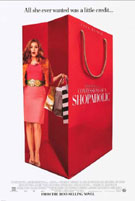Every Manhattan-set movie or book aimed at women, from Sex and the City on down, has essentially been part of a fantasy world. There are few black people, or poor people, or anyone who can't pronounce Christian Louboutin, and all it takes for success is some wide eyes, a trim waistline, and a fix on the perfect guy.
But Confessions of a Shopaholic takes the whole chick lit package, the candy colored dresses and the personal chauffeurs, to a ridiculous, intolerable new level. Isla Fisher, normally an appealing and capable actress, is reduced to a fluffy pink stereotype here, and all the name-brand talent surrounding her gets shoved into one-line cameos, all to make room for more shopping montages. Setting aside the unintentionally funny moments that remind you how distant this movie is from the economic crisis we're in, Shopaholic is awful in its own right-- shallow and screechy and completely rotten at its core.
Fisher's Rebecca Bloomwood is intended as a lovable goofball sort of character, a less world-weary Carrie Bradshaw, but largely comes across as an idiot as she shops her way into $16,000 in debt, then stumbles into a job at Smart Savings magazine. The editor who hires her (Hugh Dancy) seems about as blindsided by her looks as he is impressed with her talent, and for inexplicable reasons overlooks her complete lack of financial knowledge, bizarre behavior (she's evading a debt collector, you see) and overall stupidity to keep her hired.
And of course, it turns out she's a hit-- because most Americans are as stupid as Rebecca, and we need her to explain finance in terms of shoes and handbags. She impresses the president of the publishing company (John Lithgow, wasted in a stern suit role) and even the haughty editor (Kristin Scott Thomas) of the fashion magazine she really wanted to work for to begin with.
With her life on the upswing Rebecca promises her sensible, slightly kooky roommate Suze (Krysten Ritter) that she'll get her finances in order. But there are balls to attend! And mannequins who actually come to life and coax her into stores. Of course, just when Rebecca thinks she has it all, her personal financial troubles come back to haunt her, and it's up to her to sort things out, win back her man, and give us the generic ending demanding by anyone who bothered to buy a ticket for this.
Most of the intended comedy comes from Rebecca's various pratfalls, which include hiding in a clothes rack to steal back a letter, fighting other women at a sample sale and diving across the table to answer the phone. In most movies these kinds of slips endear us to the female character, but here they only serve to make Rebecca seem like more of an idiot, devoid of all personality except a fetishistic love of shoes. In one scene, Fisher gets to cut loose and dance, showing wild moves similar to what made her notable in Wedding Crashers. But the scene doesn't fit at all with her character, and immediately after Rebecca is back to blank, cute neutral. It's as if Fisher took the reins for one moment and gave actual characterization a shot, but director P.J. Hogan stopped her before it was too late.
Everyone in the movie overacts wildly, with the exception of cool British Dancy, but especially grating are Ritter and the always-hyper Joan Cusack, both of whom bug out their eyes at least twice a scene. The mugging is almost preferable,to the blank presence from so many other actors, including Lithgow, John Goodman as Rebecca's dad, and Scott Thomas, whose customary restraint gets swallowed by the movie's frenetic pace.
There's lots to look at, between Patricia Field's gonzo costumes and Dancy's sparkling blue eyes, but nothing to feel in Shopaholic, other than a deep regret that we ever thought this kind of lifestyle was funny, much less admirable. Sophie Kinsella's books, on which the film is based, were written at the beginning of this boom decade, but feel as antiquated here as a story from the Gilded Age. A better, smarter movie could have let us forget modern troubles and lose ourselves in this candy-colored world, but Shopaholic has too many comedic dead spots and too little wit to carry anyone away.
Staff Writer at CinemaBlend












